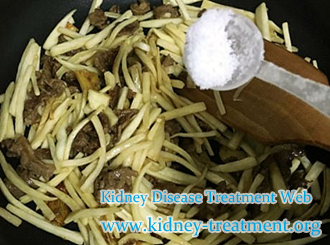Can Kidney Disease Patients Eat Low Sodium Salt at Will
2018-04-11 11:40
 Low salt diet is a basic requirement for patients with kidney disease. It seems like a simple diet principle which is not easy to be done well. After all, many people have been eating salt for many years. So, it is hard to accept the sudden change in salt intakes and light taste of the meal.
Low salt diet is a basic requirement for patients with kidney disease. It seems like a simple diet principle which is not easy to be done well. After all, many people have been eating salt for many years. So, it is hard to accept the sudden change in salt intakes and light taste of the meal.
Moreover, we can't stop eating salt at all, since we will be weak very much without salt intakes. Therefore, what should I do? Recently, there was a similar message from a patient. Another question was asked "can low sodium salt replace ordinary salt? Can you eat low sodium salt?" Let's find out the answer later.
Firstly, we'll know more about what the low sodium salt is.
Normal common salt: the content of sodium chloride is 99.1%, besides, there are a small amount of water, impurities, calcium, iron and other elements.
Low sodium salt: containing sodium chloride, potassium chloride, and a few Magnesium Sulfate. The content of potassium chloride is about 30%.
It shows that the content of sodium in low sodium salt is 30% lower than that in normal salt, while the potassium is increased to 30%. The potassium in low sodium salt is higher than the ordinary salt.
Low sodium salt can help reduce blood pressure, diminish cardiovascular risk and regulate the balance of potassium and sodium in elder and hypertensive patients. But for most patients with kidney disease, low sodium salt can damage the kidneys, what is not conducive to protecting renal function.
So can kidney disease patients take low sodium salt? The answer, of course, is negative.
Why does low sodium salt hurt the kidneys? There are 2 main reasons:
First, the principle of low salt diet is to reduce the intake of sodium salt rather than using other salt instead of ordinary edible salt. This did not achieve the purpose of salt restriction for having the effect of recovering kidneys, rise instead counteractive.
Second, most patients with kidney disease are usually not lack of potassium. And low sodium salt contains 30% potassium, eating the it for a long time will lead to the occurrence of high potassium level in blood. Additionally, the excessive intake of potassium can not be promptly excluded due to the poor renal function in kidney disease patients, causing hyperkalemia.
The harm of hyperkalemia, which many kidney disease patients are not aware of, will be focused on in the section.
The standard of blood potassium is 3.5-5mmol/L, and the range to be alert is 5-6mmol/L. Once it exceeds 6mmol/L, presenting more dangerous, we must control it in time, especially in stage 4 and 5 of chronic kidney disease patients whose the ability of potassium excretion is poor,
1.Elevated blood potassium can make limbs and body muscles weak and paralyzed.
2.When blood potassium is too high in patients with kidney disease, there will appear serious heart problems, resulting in abnormal heartbeat, serious heartbeat arrest and life safety.
Therefore, no matter which stage of kidney disease the patients are staying, they should be far away from low sodium salt. If you want to eat it, we must consult the doctor in advance and strictly according to the doctor's advice.
For more information, welcome to contact us directly.
E-mail: kidney-treatment@hotmail.com
- Tag: Chronic Kidney Disease Diet
- Pre: Is Fish Good For Stage 3 CKD Patients
- Next: Is Drinking As Much Water As Possible Good or Bringing dialysis
